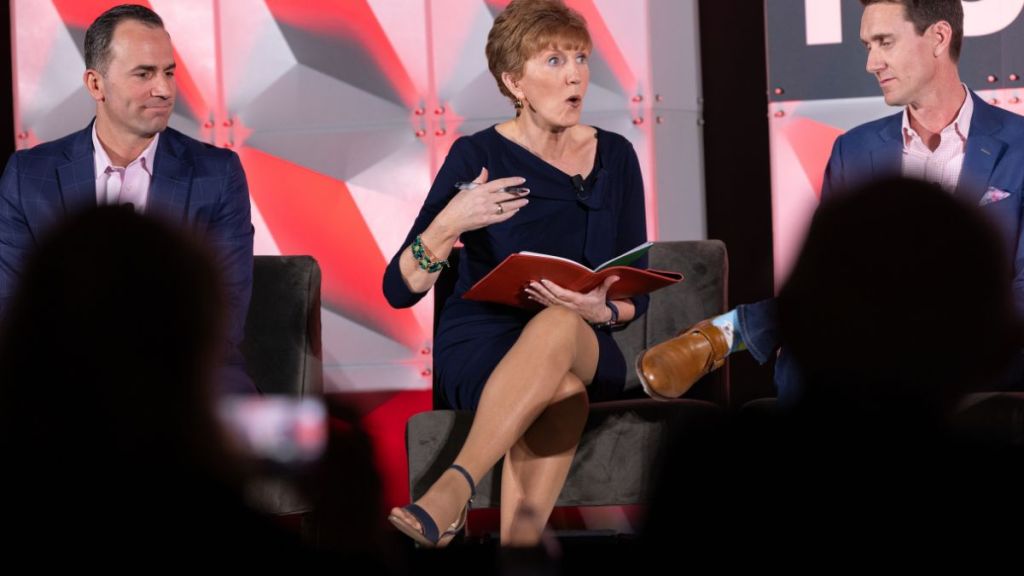
While industry leaders may be taking a more optimistic view on some of the changes triggered by the commission lawsuits and how the National Association of Realtors settled them, they still feel strongly that changes to the commission structure will have an overall negative impact on consumers.
“I don’t feel that the space that we are moving into is going to somehow be better for the consumer,” Anthony Lamacchia, the broker-owner of Lamacchia Realty, said Monday morning during a panel discussion at HousingWire’s annual conference The Gathering. “The other side wants to make it sounds like it is to make themselves feel good and catch news headlines.”
At the top of industry leaders’ minds for how the outcome of these lawsuits will potentially harm consumers is how buyers will be able to afford and pay for buyer representation.
“I would love to see Fannie Mae and Freddie Mac allowing some type of financing of the commission, but I don’t think it will happen,” Lamacchia said. “I tend to think that it will be negotiated into the transaction, but a first-time buyer is going to have a hard time competing with someone buying their second or third home who can just pay their agent out of pocket.

“That is the part of this that I don’t like, but the plaintiffs’ attorneys and the Department of Justice think that they know better, and I think that we are going to have to go through this, see it happen for a period of time, and when there are some sad stories of people not being able to land a home, which there inevitably will be, I think maybe down the line we’ll see some kind of change on it.”
Like Lamacchia, NextHome CEO James Dwiggins also believes the potential changes to the commission structure will hurt first-time, low-income buyers and U.S. Department of Veterans Affairs (VA) borrowers. But Dwiggins is more optimistic that the government-sponsored enterprises (GSEs) will come around sooner rather than later.
“I think there is a very easy path to get Fannie and Freddie to do it — if they are issued by Congress with a swipe of their pen,” Dwiggins said. “I would run an ad campaign on how these class-action cases just screwed veterans, minorities and low-income Americans.
“And you can thank the (Biden) administration, the DOJ and class-action lawyers — and the intended and unintended consequences, however you want to spin it — and watch how fast Republicans step up to protect veterans and watch how fast Democrats step up to protect minorities and low-income Americans. You’d get a bipartisan bill in an election year, and they would tell Fannie and Freddie to figure it because they will want votes.”
While many attendees would like to see the outcome Dwiggins believes is possible, there is a chance that isn’t the case. That means the industry may see more buyers go unrepresented, as well as a potential uptick in dual agency transactions.
“I think you are going to see a lot more dual agency and a lot more unrepresented buyers, especially during this flex time where buyer’s agents are kind of figuring out how they are going to discuss and present the structure of what this new relationship with a buyer looks like,“ said Pete Voss, the founder and owner of 3% Listing Co., a brokerage that lists and markets properties for sellers, allowing them to decide if they wish to compensate the buyer’s broker.
Because of his firm’s structure, Voss said he already sees a decent share of unrepresented buyers, but for transactions where buyer’s agents are involved, Voss said buyers typically request that the seller pays the buyer representation fees in their offer, as Lamacchia believes may happen moving forward.
Although this approach to dealing with buyer agent fees may work in the current housing market, leaders noted that it might not be the case if market conditions heat up, putting sellers more in control of transactions.
“Here is the question: If you are representing the seller, it is your responsibility to market the listing, and in a market that you know the seller is going to get 15 to 20 offers, do you offer compensation to the buyer’s agent? Is that in the seller’s best interest? I’m asking hypothetically,” Dwiggins posited.
“Or do you let the buyers write their offers, maybe put a stipulation in that says you would be open to conversations about concessions, and then let the offers speak for themselves? I don’t know. I’m simply stating that in this new world, you have to be thinking about how you are going to look at how market conditions are going to dictate that.”
As Voss noted, however, if buyers are unable to finance or afford buyer agency fees because sellers are unwilling to pay them, there will be an uptick in dual agency roles and unrepresented buyers, something Dwiggins see as a potential field day for the DOJ.
“I believe nine states right now ban dual agency, but if this gets out of control, mark my words today on this stage, the Department of Justice is going to target that next, so it is extremely important as brokers in the room that you figure out how you want to handle this,” Dwiggins said.
Additionally, Dwiggins sees the possibility of an increase in errors and omissions insurance costs for agents and brokers, as unrepresented buyers and dual agency are major sources of insurance claims.
“If something goes to suit, that means one carrier is picking up that claim and having to deal with it versus having some sort of negotiations,” Dwiggins said. “You want to watch insurance policies skyrocket, watch what is going to happen if we don’t start thinking about making sure the buyer has representation.”
As it remains unknown if the GSEs will allow buyers to finance their agent fees, industry leaders highlighted the importance of brokers discussing compensation structures and the challenges that buyers are facing with their seller clients.
“What we are saying to sellers is that they can help buyers solve the problem of how to pay their agent’s commission — and that has worked magically,” said Linda O’Koniewski, CEO of Leading Edge Real Estate.
Lamacchia added that buyers are typically looking for a smooth transaction and they will “continue to take the path of least financial resistance.”
“If you are not proactively offering compensation or not having some willingness to entertain conversations about that, you are going to have less buyers interested in your home,” Lamacchia said.
Equally important as having these conversations with sellers is to have them with buyers about what agents can offer them.
O’Koniewski noted that many mainstream news media outlets have painted the real estate industry — and buyer agents, in particular — in a negative light, so agents trying to win over buyers must flip the script.
“One of the things we are up against is not, ’Should I hire this person?’ It is, ’What can you do for me as a buyer’s agent that I can’t do myself?’” O’Koniewski said.
Due to this, Dwiggins feels it is time for agents to treat their buyers like sellers.
“If you go to a listing appointment, you don’t just walk in and hand the seller a listing agreement and ask them to sign it. You sit down an do a presentation. You articulate your value and explain what you do, and what marketing products and services they are paying for and how you are going to help them sell their house,” Dwiggins said. “We haven’t been doing that on the buy side and we need to do it.”
For Dwiggins, simply noting your experience as an agent won’t be enough. Agents will have to pull back the curtain and show buyers everything that goes into buying a home, making the value provided to buyers abundantly clear.
While industry leaders noted that some people are concerned about speaking up, they urged their colleagues and competitors to take a stand and be vocal about the potential outcomes and consequences of these lawsuits.
“I think it takes the mortgage professionals in this room — brokers and agents all — to be having these conversations,” Dwiggins said. “Stop being scared. Lead from the front. We’ve already all been sued. That doesn’t change anything.
“The lawyers are going to get paid from the settlements already in place. Other settlements are going to occur. We are going to move on, but what we also need to do as an industry is to start leading from the top. We need to start controlling these conversations.”




